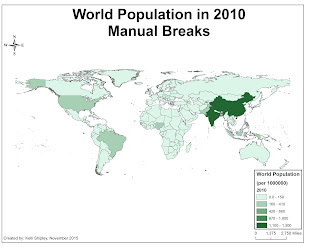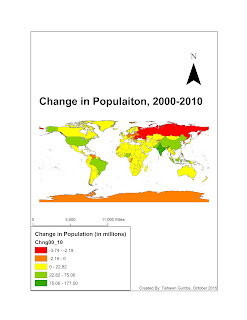It is not the best assignment since I had problems getting the spreadsheet to connect and by the time I was able to figure it out my I had thirty minutes until some of the features were over. So I deeply apologize if i ended the course on a poor note.
Tishawn
Thursday, November 26, 2015
Wednesday, November 25, 2015
Wednesday, November 18, 2015
Saturday, November 14, 2015
Sunday, November 1, 2015
7 Assignments
Buffer: Creates buffer polygons around input features to a
specified distance.
Clip: Extracts input features that overlay the clip
features. Used to cut out a piece of one feature class using one or more of the
features in another feature class as a cookie cutter, and also for creating a
new feature class.
Intersect: Creates a geometric intersection of the input
features. Features or portions of features which overlap in all layers and/or
feature classes will be written to the output feature class.
Union: Creates a geometric union of the input features. All
features and their attributes will be written to the output feature class.
Merge: Combines multiple input datasets of the same data
type into a single, new output dataset. This tool can combine point, line, or
polygon feature classes or tables.
Dissolve: Aggregates features based on specified attributes.
Friday, October 30, 2015
Graduated Symbol Map
Buffer- Creates buffer polygons around input features to a specified distance
Clip- This is basically used to select and cut out a part of the data you want to use from a bigger area
Intersect- Allows for only the features or it parts which overlaps or intersects in layers to create a new file
Union- Shows all features and their attributes in the output feature class unlike with intersect where only the common part is shown.
Merge- Combines multiple inputs of the same data type to create one output
Dissolve- Groups features based on specific attributes
Sunday, October 18, 2015
Week 6 Assignment: Choropleth Maps
This map represents a graduated symbol map.
This is a manual break map
This is a natural break map.
This map shows the population change from 2000 to 2010.
This map shows the standard deviation in 2010.
Thursday, October 8, 2015
Monday, October 5, 2015
Thursday, September 24, 2015
Effective and ineffective GIS Mapping systems
Effective
1. Choropleth Maps
These maps contain areas that are shaded or patterned in proportion to the statistical variable being displayed on the map. Data are aggregated over predefined areal units, for example standardized data such as rates of growth, etc.
2. Isopleth Maps
These maps show smooth continuous information, as data are depicted using lines that connect points of equal numerical value. This is very good for mapping weather and pollution data.
Ineffective
1. Graduated symbol maps
These maps contain symbols varying in size to show their relative quantitative values; used with point/location data. This cannot be used for standardized data and sometimes can be too inaccurate with the symbols.
2. Cartogram Maps
In these maps, each mapped area's spatial geometry depicts an attribute other than area. The downside with this one is that the methods into making this map are complex and interpretation can be very difficult.
Effective
1. Choropleth Maps
These maps contain areas that are shaded or patterned in proportion to the statistical variable being displayed on the map. Data are aggregated over predefined areal units, for example standardized data such as rates of growth, etc.
2. Isopleth Maps
These maps show smooth continuous information, as data are depicted using lines that connect points of equal numerical value. This is very good for mapping weather and pollution data.
Ineffective
1. Graduated symbol maps
These maps contain symbols varying in size to show their relative quantitative values; used with point/location data. This cannot be used for standardized data and sometimes can be too inaccurate with the symbols.
2. Cartogram Maps
In these maps, each mapped area's spatial geometry depicts an attribute other than area. The downside with this one is that the methods into making this map are complex and interpretation can be very difficult.
Thursday, September 10, 2015
Assignment 1
a.Where have you personally seen GIS being used?
I have personally seen GIS being used on weather channels to better portray what the reporters are saying, in malls to inform shoppers of where different buildings are located and during elections when they are counting ballots.
b. How could you see yourself using GIS in the future(what field)?
At this point, i am not exactly sure which career path i am going to take so i cannot say for sure in what field i am going to use GIS. Though i am not sure about my future career path, i have recently found myself interested in the idea of becoming a geoscientist in which i know that a knowledge of GIS would be useful. I am also an economics major so if i end up changing my mind about becoming a geoscientist i will most likely pursue a career in which both geography and economics are involved and i can use GIS.
a.Where have you personally seen GIS being used?
I have personally seen GIS being used on weather channels to better portray what the reporters are saying, in malls to inform shoppers of where different buildings are located and during elections when they are counting ballots.
b. How could you see yourself using GIS in the future(what field)?
At this point, i am not exactly sure which career path i am going to take so i cannot say for sure in what field i am going to use GIS. Though i am not sure about my future career path, i have recently found myself interested in the idea of becoming a geoscientist in which i know that a knowledge of GIS would be useful. I am also an economics major so if i end up changing my mind about becoming a geoscientist i will most likely pursue a career in which both geography and economics are involved and i can use GIS.
Wednesday, September 9, 2015
Tishawn Gumbs
Assignment B
a. Where have you personally seen GIS being used?
I know that GIS can be used for displaying maps showing different aspects such as current events, trends and changes. I personally, after obtaining knowledge of the GIS system can say that I have seen it many places, most notably in an international airport where there are a lot of complexes and places to go. At the entrance there was a map which was color coded by section and clearly stated what each section was for, whether it was for malls, departures, arrivals, the waiting room etc. I was easily able ti navigate myself, and this being my first time at the airport it was well laid out. I've also seen it used on live weather channels. For example, when they are describing the weather vocally, the weather maps are moving in concurrence with time, showing current events and it repeats several times during the broadcast to have an idea of what is currently taking place.
b. How you could see yourself using GIS in the future (what field)?
I aspire to become a meteorologist, and have been aspiring to become one since I was five years old. My love for weather is beyond doubt and I know that broadcasting the weather, along with all other a aspects of meteorology, involves the use of maps and GIS systems. Maps are commonly used in broadcasting weather, tracking storms and weather patterns, and showing levels of elevation. I really aspire in going into the hurricane hunters and being in the eye of the storms. Maps using GIS systems will be crucial in finding location, displaying radar and its intensity, and satellites to avoid interference with other satellites.
Assignment B
a. Where have you personally seen GIS being used?
I know that GIS can be used for displaying maps showing different aspects such as current events, trends and changes. I personally, after obtaining knowledge of the GIS system can say that I have seen it many places, most notably in an international airport where there are a lot of complexes and places to go. At the entrance there was a map which was color coded by section and clearly stated what each section was for, whether it was for malls, departures, arrivals, the waiting room etc. I was easily able ti navigate myself, and this being my first time at the airport it was well laid out. I've also seen it used on live weather channels. For example, when they are describing the weather vocally, the weather maps are moving in concurrence with time, showing current events and it repeats several times during the broadcast to have an idea of what is currently taking place.
b. How you could see yourself using GIS in the future (what field)?
I aspire to become a meteorologist, and have been aspiring to become one since I was five years old. My love for weather is beyond doubt and I know that broadcasting the weather, along with all other a aspects of meteorology, involves the use of maps and GIS systems. Maps are commonly used in broadcasting weather, tracking storms and weather patterns, and showing levels of elevation. I really aspire in going into the hurricane hunters and being in the eye of the storms. Maps using GIS systems will be crucial in finding location, displaying radar and its intensity, and satellites to avoid interference with other satellites.
Sunday, July 12, 2015
Subscribe to:
Comments (Atom)








































